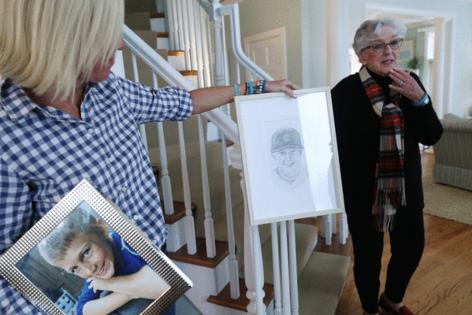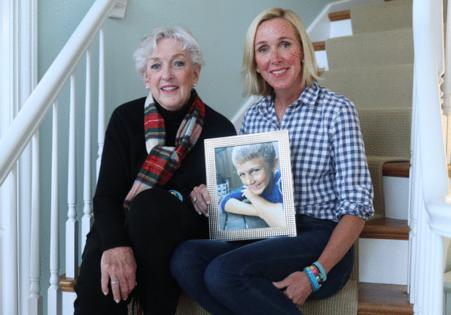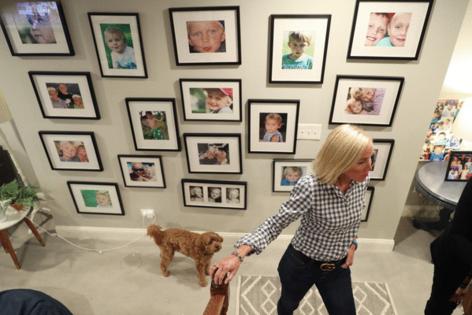Heidi Stevens: Years after his death, boy's legacy of kindness leads the way
Published in Lifestyles
At the end of every school year, Rob and Nora Tonn show up at Hinsdale Central High School and give away scholarships to graduating student athletes who are kind.
Maybe the athletes are also fast and maybe they also won a lot and maybe they’re going on to play their sport in college. But also, maybe not.
“We ask for nominations from coaches,” Rob Tonn said, “and we say ‘Tell us about the kid who reminds you of Brooks.’”
Brooks is their son. He died Dec. 1, 2017, from rhabdomyosarcoma, a rare cancer that forms in the body’s soft tissue. He was 10 years old.
This spring, he would have graduated alongside the other kids at Hinsdale Central. Instead, his classmates — even the ones who never met him — honored him with turquoise ribbons on their gowns.
This fall, he should be heading to college. Instead, seven of his classmates will start their next chapter with scholarships in his name, spreading what he stood for: Kindness. Friendship. Radical, resilient, invincible joy.
The summer of 2017, when he and his dad were taking the 7 a.m. Metra from Hinsdale to Chicago for regular rounds of chemo, Brooks played 57 baseball games.
“One game, he had chemo that morning, got to baseball, threw up in the bushes, went in and played,” Nora Tonn told me the first time I met her family.
“That’s the day he hit a grand slam,” Nancy Keenan, Nora’s mom, added. “His teammates carried him off the field on their shoulders.”
Brooks also played football for the Hinsdale Falcons. He walked up to his coach on the first day of practice and said, “Hey! I’m one of the quarterbacks.” His coach said, “Is that right?”
One day all the Falcons gathered at a player’s house and filled the boy’s living room. Then-Northwestern football coach Pat Fitzgerald showed up on the TV screen with a message he recorded for Brooks.
“We’re so inspired by you and your toughness and your grit and your ability to persevere and fight through tough times,” Fitzgerald said.
Afterward, the team headed to the backyard and shaved their heads. They wanted to match Brooks, whose hair had fallen out from chemo.
They couldn’t cure his cancer. But they made sure he wasn’t fighting it alone.
Two years after his death, Nora and Rob Tonn launched Brooks Strong, a 501(c)(3) nonprofit with two goals: to fund pediatric cancer research and to cover the costs of youth sports for kids with cancer, whose parents are often struggling to cover medical bills and don’t have the money for lessons and team fees and equipment.
In 2020, they gave their first grant to a boy named Dylan Provenzano. Dylan and Brooks had met in the hospital when Dylan was 12. He was diagnosed with cancer a month after Brooks was diagnosed. They both loved baseball.
When Dylan was 15, his mom, Sam Provenzano, learned about Brooks Strong and applied for — and received — a grant. The money covered Dylan’s equipment and six months of travel baseball.
“He’s so happy, and we can breathe,” Provenzano told me when she first got the news. “We’re forever indebted to them. Anyone who makes your kid happy, you owe them the world.”
Dylan went on to play baseball at Carthage College.
Over the years, the Tonns added $1,500 scholarships for graduating student athletes to the mix. It’s another way to honor Brooks, they said. It’s another reason to talk about him.
“You get so fearful that people will forget him,” Nora Tonn said. “You know, people move on. But they haven’t.”
The day the Tonns handed out this year’s scholarships, Rob Tonn read aloud letters about each kid. The coaches wrote them, explaining how the athletes exemplified what Brooks was all about.
“The fact that some of his friends were the ones nominated,” Rob Tonn said. “That says something, right?”
It says a lot of things.
It says Brooks' kindness planted a seed. It says that seed keeps growing. Through his parents’ hard work to honor him and stay close to him and make sure other kids get a chance to play (to play!), it keeps growing.
I checked in with Keenan, Brooks’ grandmother, a few days ago.
“He keeps doing so much good,” she told me. “Even in his death.”
Showing us the way.
“You have to look for the bright lights,” Keenan said. “And there are plenty.”
That’s how we see our way through the dark.
©2025 Tribune News Service. Distributed by Tribune Content Agency, LLC.





























Comments